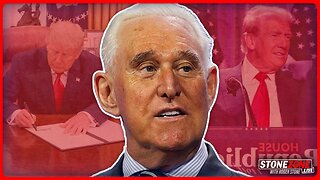Premium Only Content

Brunson brothers lose at SCOTUS
Brunson brothers lose at SCOTUS
By Terry A. Hurlbut
The Supreme Court formally denied review of the case of Brunson v. Adams (Docket No. 22-380) in its January 6 conference. As is usual with the Court, they made no comment. We know only that fewer than four Justices voted to grant review. We do not know how many, if any, Justices so voted.
The Brunson case in sum
Raland J. Brunson and his three brothers developed a theory that 385 Members of Congress failed to defend the Constitution. According to them, the Election of 2020 had many irregularities in the appointment of Presidential Electors. The Brunsons specifically raised a question of Chinese interference in the Electoral College appointment process. As such this required an investigation – and those 385 Members refused to investigate. They include 94 Senators and 291 Representatives.
The Brunson brothers sued President Biden, Vice-President Harris, former Vice-President Pence, and every Senator and Representative who voted not to investigate the Election. Furthermore, they sought the removal from office of the President, the Vice-President, and the Congressional defendants.
Prof. Timothy Canova of the NSU Florida Shepard Broad College of Law offered his speculation on why the Court bothered to put this case on the docket. He spoke of legislation the Court might fear that Congress might consider to clip the Court’s wings. These included judicial term limits, a mandatory retirement age, and enlargement of the Court. Prof. Canova also spoke of the Twitter Files revelations, including revelations of Twitter staff complicity in election interference.
Congress did not pass any of the measures Canova mentioned that the Court most feared. As to the Twitter Files, the case of Missouri v. Biden already addresses the “State actor” activities of Twitter, Facebook, and other social media. So any hypothetical provocation to the Court did not happen, or else the judiciary is already handling it.
Why the Court denied the petition
Again, the Supreme Court made no comment on why they denied the petition, nor how many voted either way. But CNAV can readily guess. The U.S. District Court for the District of Utah found that the Brunson brothers lacked standing. The elements of standing to bring any complaint before a court are:
• Injury in fact that the plaintiff can claim,
• Traceability of that injury to the conduct of the defendant, and
• A remedy that the court has the authority to order.
The federal courts have a reputation for refusing to recognize any “injury in fact” to an ordinary citizen for a defendant’s failure to abide by the Constitution. But even were a court to allow that an injury took place, the Brunsons faced another high hurdle. Courts do not remove Presidents, Vice-Presidents, Senators, or Representatives from their offices.
The Constitution says this about Senators and Representatives (Article I Section 5):
Each House shall be the Judge of the Elections, Returns and Qualifications of its own Members.
Article I Section 5 Clause 1
Each House may … punish its Members for disorderly Behaviour, and, with the Concurrence of two thirds, expel a Member.
Article I Section 5 Clause 2
On impeachment
Presidents, Vice-Presidents, Executive civilian officers, judges, and Justices are subject to impeachment. The House of Representatives brings all impeachments; the Senate tries them. No other authority has any jurisdiction over such people. The House Historian keeps this record of all persons subjected to impeachment.
But the House may not impeach a Senator. Only once has the House tried to impeach a Senator (Senator William Blount of Tennessee). Senator Blount faced charges of conspiring to help Great Britain seize Spanish-controlled territories where Florida and Louisiana now stand. The Senate refused to try the case for lack of personal jurisdiction of the House over any Senator. (The Senate did find merit in the charges, and expelled Blount from the Senate before acting on his impeachment.)
All of which to say that the courts have no jurisdiction over any of the defendants the Brunson brothers named. That would be reason enough not to let this case go any further.
Moreover, none of the Justices issued any dissenting opinion on the denial of review. Any Justice who would have voted to review this matter probably would have wanted his reasons on record. So perhaps the Court unanimously rejected this case. Contrary to popular belief, the Court decides most of its cases unanimously. Most cases turn on elementary points of law and procedure that the Court expects everyone to know. Brunson v. Adams would be one of them.
Link to:
The article:
https://cnav.news/2023/01/09/foundation/constitution/bronson-bros-lose-scotus/
The docket listing:
https://www.supremecourt.gov/search.aspx?filename=/docket/docketfiles/html/public/22-380.html
Declarations of Truth Twitter feed:
https://twitter.com/DecTruth
Conservative News and Views:
https://cnav.news/
The CNAV Store:
https://cnav.store/
Our Silver Lines
https://oursilverlines.com/
-
 25:37
25:37
Declarations of Truth
3 days agoTariffs, counter-tariffs, and civilization
130 -
 2:16:49
2:16:49
TheSaltyCracker
2 hours agoMusk Destroys Gov't Money Pot ReeEEeE Stream 02-05-25
64.9K137 -
 1:10:59
1:10:59
FreshandFit
2 hours agoTop 3 Ways To Overcome A Break Up
13.8K1 -
 LIVE
LIVE
Akademiks
3 hours agoDrake Finally CUTS off FAKE FRIENDS in the Industry. VIOLATES KHALED, LEBRON! Announces album Feb14
3,553 watching -
 27:28
27:28
Glenn Greenwald
6 hours agoGlenn Reacts to Trump's Gaza Take Over: System Update Special
120K234 -
 2:13:49
2:13:49
Melonie Mac
3 hours agoGo Boom Live Ep 36!
26K7 -
 1:02:11
1:02:11
Sarah Westall
3 hours agoFreezing USAID & its Operations in Ukraine: A Massive Money Laundering Organization? w/ Sam Anthony
43.7K5 -
 DVR
DVR
Space Ice
7 hours agoSpace Ice & Redeye: Neil Breen's Pass Thru
6.6K1 -
 1:00:23
1:00:23
The StoneZONE with Roger Stone
3 hours agoRoger Stone Talks Trump’s Electric First 100 Day Agenda | The StoneZone w/ Roger Stone
15.2K5 -
 DVR
DVR
Redacted News
6 hours agoBREAKING! EPSTEIN LIST INCOMING UNDER AG PAM BONDI? DEMOCRATS FREAKING OUT, PRINCE ANDREW NERVOUS
158K227